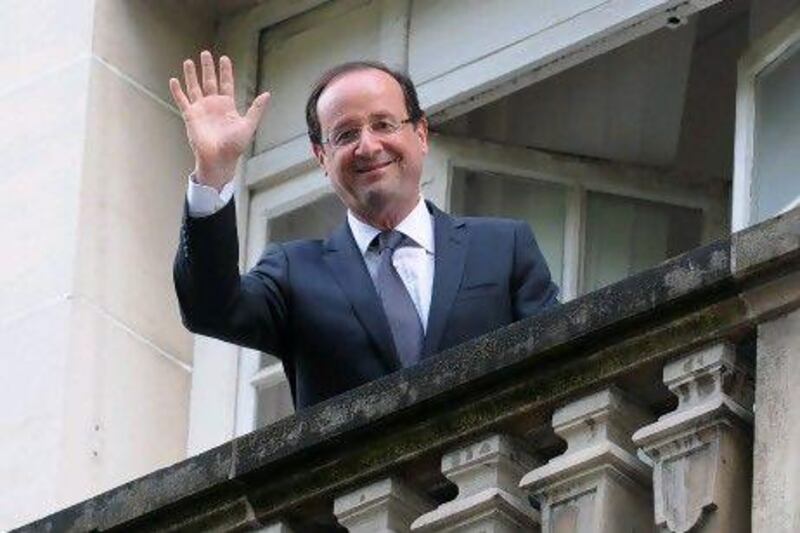MARSEILLE, FRANCE // The new French president, François Hollande, faces early tests of his ability to prove himself on the world stage while also grappling with France's economic ills and seeking a parliamentary majority to underpin his programme.
The euphoria of the Place de la Bastille in central Paris on Sunday night, where tens of thousands of jubilant Socialist party supporters gave Mr Hollande a rapturous reception after he defeated Nicolas Sarkozy, gave way to renewed financial jitters yesterday as the markets opened sharply down.
Falls in the values of stocks and the euro also reflected unease over simultaneous elections that left Greece with a split government amid gains for parties on the far left and far right.
But Mr Hollande also faces an uphill struggle to agree with the Germany chancellor, Angela Merkel, on how to tackle the eurozone's debt crisis.
Many European conservatives interpreted the defeat of Mr Sarkozy, Ms Merkel's centre-right ally and co-architect of the pact imposing strict fiscal discipline on the single-currency area, as a potentially destabilising development threatening a new period of chaos.
In the end, a classic European fudge is likely to be sought in an effort to produce as united a front as is possible to maintain the Franco-German leadership of the zone.
The new French leader accepts the need to reduce France's own public deficit but bitterly opposes excessive reliance on the austerity measures that have forced a procession of European leaders out of office.
Mr Hollande, the first socialist to win a French presidential election since François Mitterrand secured a second term in 1988, formally takes office a week from today.
He has accepted Mr Sarkozy's invitation to join him today at traditional May 8 celebrations marking the defeat of Nazi Germany in the Second World War.
He is also expected to move quickly to appoint a prime minister in the knowledge that the relatively narrow margin of his win - 51.62 per cent of the poll, giving him a lead of just more than 3 per cent - may make a cautious choice advisable.
Parliamentary elections are due next month, and Mr Hollande will need to be wary of Marine Le Pen's far-right Front National exploiting the turmoil in Mr Sarkozy's ruling UMP party.
Barack Obama, the United States president, was not far behind Ms Merkel on Sunday night in congratulating Mr Hollande on his victory.
Mr Obama will soon have an opportunity to assess on his home ground how well he can work with the new French leader. Mr Hollande is due at Camp David for a summit of the Group of Eight world economic powers on May 18 and 19. He will then travel to a Nato meeting in Chicago, where partners will seek a full explanation of his election pledge to withdraw all French troops from Afghanistan by the end of this year.
The two presidents are likely to have a meeting at the White House during Mr Hollande's visit to the US.
Mr Obama's spokesman, Jay Carney, said that the president "looks forward to working closely with Mr Hollande and his government on a range of shared economic and security challenges", diplomatic language that barely disguises the differences they also share on how to meet those challenges.
However, Mr Hollande's victory speech at the Bastille, with its ringing declaration that austerity "can no longer be the only option", probably caused less apprehension outside than might have been expected. José Manuel Barroso, the head of the European Commission, said he shared Mr Hollande's goal of giving a jump-start to Europe's economy.
"We clearly have a common objective: relaunching the European economy to generate durable growth," he said. "We must now transform these aspirations into concrete actions."
Britain's prime minister David Cameron, who supported Mr Sarkozy despite sharp disputes of their own, said he, too, would work with Mr Hollande.
British Conservatives believe France's debt levels will quickly push Mr Hollande away from his tax-and-spend ambitions.
The Spanish conservative prime minister Mariano Rajoy - who is also pursuing a policy of severe cuts - showed scant enthusiasm for the French election outcome, saying on radio it was his "obligation" to get along with Mr Hollande and "try to work together for the benefit of Spain, France and Europe".
There were warmer greetings from the UAE. President Sheikh Khalifa bin Zayed Al Nahayan sent a message wishing Mr Hollande success and expressing the hope of "further progress in relations" between the two countries, in a statement reported by the WAM news agency.
Qatar's emir, Sheikh Hamad bin Khalifa Al Thani, also congratulated Mr Hollande while Bahrain's King Hamad sent good wishes noting the "deep and strong ties between the two countries".
Tehran yesterday called for a new era in relations between Iran and France. Mr Sarkozy was one of the international community's strongest critics of Iran's nuclear programme.
The Iranian foreign ministry spokesman, Ramin Mehmanparast, was quoted by the IRNA news agency as calling for a fresh approach to replace Mr Sarkozy's "hostility towards the Islamic republic of Iran". He said the outgoing president lost because he aligned his policies with those of the United States.
* With additional reporting by Agence France-Presse






